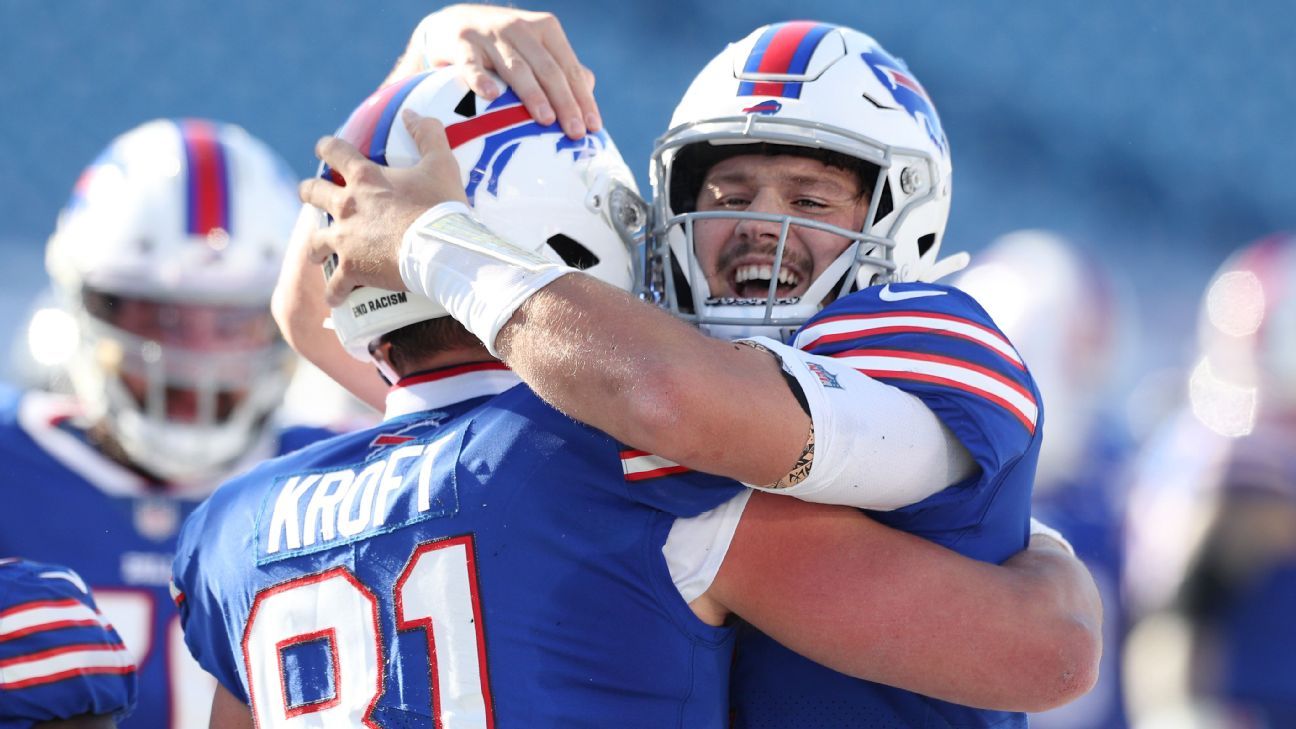BUFFALO, N.Y. — Brandon Beane didn’t mince words during his end-of-season news conference in January, particularly when it came to the Buffalo Bills‘ tight ends.
The general manager had just seen his Bills’ defense get torched by the best tight end in the NFL for the second time during the 2020 season and admitted that his roster didn’t have a player comparable to Kansas City’s Travis Kelce. The combination of Tyler Kroft, Lee Smith and 2019 third-round pick Dawson Knox combined for 442 yards and eight touchdowns during the 2020 season, which will likely convince Beane to upgrade the position this offseason.
“We just never really got that position,” Beane said. “At the end of the year, I thought we did a little bit, Dawson started to get his groove. But it was never where the opposing defense was like, ‘man, we’ve got to stop their tight ends from going off.’ So we’ll into look to that group.
“At the end of the day, we’d love to have a guy like what we just faced in Kansas City — they don’t come very often. But that’s what we want. We’ve got some guys here we want to continue to develop and see what happens. Obviously, if there’s ways to add competition, whether that’s in free agency or the draft, we would do that, as well.”
Buffalo’s tight ends, to be fair, dealt with adversity this past season.
Knox, 24, entered the season on the heels of a promising rookie campaign, in which he dropped a league-high 20% of his passes but flashed some playmaking ability that enticed Beane to trade up for him in 2019. Although his drop percentage declined significantly, Knox missed four games in 2020 as he battled a calf injury and COVID-19, and thus struggled to find his rhythm.
Kroft, on the other hand, was twice placed on the reserve/COVID-19 list — once as a close-contact and again after registering a positive test. He played 10 games but was a healthy scratch when all the Bills’ tight ends were healthy.
Beane mentioned adding competition this offseason and there are several options.
Buffalo should keep tabs on a couple of big-name veterans this offseason, starting with Tennessee Titans tight end Jonnu Smith, who essentially matched the Bills tight ends’ production by himself this past season (he had 41 catches, 448 yards and eight touchdowns). Spotrac lists Smith’s market value at $8 million per year, which is on the higher end of affordability for Buffalo this offseason. With the NFL salary cap set to be no lower than $180 million, the Bills could be anywhere between $1 million over the cap and roughly $4 million under it, factoring in some of the Bills’ decisions on their own free agents. Buffalo’s in Smith could depend on how badly it wants to upgrade the position.
Philadelphia’s Zach Ertz is believed to be available via trade, ESPN’s Jeremy Fowler reported. It might be worth the Bills exploring a trade for a player who put together six consecutive seasons of 700 or more receiving yards entering the 2020 season.
The Bills can also look to the draft to improve their tight end room. The clear-cut gem of the 2021 draft class is Florida’s Kyle Pitts — but with the No. 30 pick, it’s highly unlikely the Bills trade up for the tight end who is expected to be a top-10 pick.
ESPN draft analyst Mel Kiper Jr. offered a few options for Buffalo later in the draft, suggesting Pat Freiermuth from Penn State as a possible second-round option. The 6-foot-5, 250-pouind tight end could instantly impact the Bills’ passing offense if they decide to spend the No. 61 pick on him. Kiper also listed Boston College’s Hunter Long as a third-round option, and Georgia’s Tre’ McKitty or Mississippi’s Kenny Yeboah as options in the fifth round.
Regardless of which route Beane decides on, expect the Bills’ tight end room to look a bit different by the time training camp comes around.

